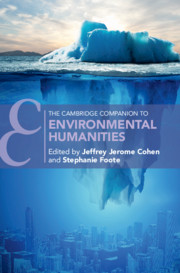Book contents
- The Cambridge Companion to Environmental Humanities
- The Cambridge Companion to Environmental Humanities
- Copyright page
- Contents
- Notes on Contributors
- Acknowledgments
- Chronology
- Chapter 1 Introduction: Climate Change/Changing Climates
- Chapter 2 The Commons
- Chapter 3 Rights
- Chapter 4 Time as Kinship
- Chapter 5 The Nature of Gender
- Chapter 6 Race, Health, and Environment
- Chapter 7 Narrative and Environmental Innovation
- Chapter 8 Climate Fictions: Future-Making Technologies
- Chapter 9 Apocalypse/Extinction
- Chapter 10 Multispecies
- Chapter 11 Food
- Chapter 12 Plants
- Chapter 13 Extraction
- Chapter 14 Ice/Water/Vapor
- Chapter 15 Rocks
- Chapter 16 Coal/Oil
- Chapter 17 Waste
- Chapter 18 Ecomedia
- Chapter 19 New Materialism and the Nonhuman Story
- Chapter 20 Risk
- Chapter 21 Coda: Virus
- Bibliography
- Index
- Cambridge Companions To Literature
- References
Chapter 14 - Ice/Water/Vapor
Published online by Cambridge University Press: 12 August 2021
- The Cambridge Companion to Environmental Humanities
- The Cambridge Companion to Environmental Humanities
- Copyright page
- Contents
- Notes on Contributors
- Acknowledgments
- Chronology
- Chapter 1 Introduction: Climate Change/Changing Climates
- Chapter 2 The Commons
- Chapter 3 Rights
- Chapter 4 Time as Kinship
- Chapter 5 The Nature of Gender
- Chapter 6 Race, Health, and Environment
- Chapter 7 Narrative and Environmental Innovation
- Chapter 8 Climate Fictions: Future-Making Technologies
- Chapter 9 Apocalypse/Extinction
- Chapter 10 Multispecies
- Chapter 11 Food
- Chapter 12 Plants
- Chapter 13 Extraction
- Chapter 14 Ice/Water/Vapor
- Chapter 15 Rocks
- Chapter 16 Coal/Oil
- Chapter 17 Waste
- Chapter 18 Ecomedia
- Chapter 19 New Materialism and the Nonhuman Story
- Chapter 20 Risk
- Chapter 21 Coda: Virus
- Bibliography
- Index
- Cambridge Companions To Literature
- References
Summary
The most common physical substance on our planet, water touches and shapes human lives, cultures, and histories in all three of its physical states: solid ice, liquid water, and gaseous vapor. Environmental humanities scholarship has focused largely on oceans and large bodies of fresh water. A wider frame for water-focused ecological scholarship should also include gaseous vapor, solid ice, and other less visible forms that water takes on our planet. Engaging in turn with each of the physical phases in which humans encounter water, and distinguishing between salt and fresh liquid water, this chapter demonstrates the range and dynamism of the relationship between humans and this essential substance. The invisible touch of humidity, the glacial immensity of polar ice, the sweetness of fresh water, and the imaginative breadth of the great salt sea all provide matter for environmental analysis. The chapter contains accounts of recent water-focused writings in the environmental humanities, presents a brief literary history of water in its various shapes, and concludes by gesturing toward the possibilities for new work.
- Type
- Chapter
- Information
- The Cambridge Companion to Environmental Humanities , pp. 185 - 198Publisher: Cambridge University PressPrint publication year: 2021
References
Further Reading
- 3
- Cited by

